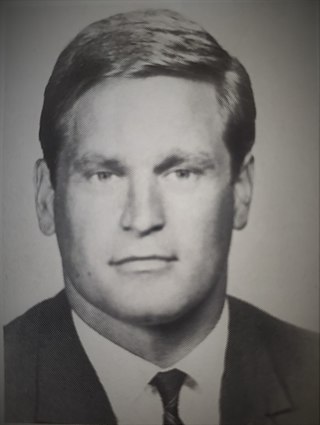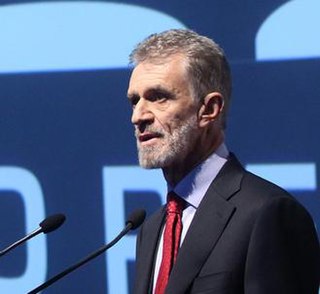
Pramod P. Khargonekar is the Vice Chancellor for Research and Distinguished Professor of Electrical Engineering and Computer Science at the University of California,Irvine. An expert in control systems engineering,Dr. Khargonekar has served in a variety of administrative roles in academia and federal funding agencies. Most recently,he served as assistant director for Engineering at the National Science Foundation (2013–2016),and as deputy director for Technology at the Advanced Research Projects Agency –Energy. From 2001 through 2009 he was the Dean of the College of Engineering at the University of Florida.
Harold (Hall) Chestnut was an American electrical engineer,control engineer and manager at General Electric and author,who helped establish the fields of control theory and systems engineering.
Karl Johan Åström is a Swedish control theorist,who has made contributions to the fields of control theory and control engineering,computer control and adaptive control. In 1965,he described a general framework of Markov decision processes with incomplete information,what ultimately led to the notion of a Partially observable Markov decision process.
Michael Athans was a Greek-American control theorist and a Professor Emeritus in the Department of Electrical Engineering and Computer Science at the Massachusetts Institute of Technology. He was a Fellow of the IEEE (1973) and a Fellow of the AAAS (1977). He was the recipient of numerous awards for his contributions in the field of control theory. A pioneer in the field of control theory,he helped shape modern control theory and spearheaded the field of multivariable control system design and the field of robust control. Athans was a member of the technical staff at Lincoln Laboratory from 1961 to 1964,and a Department of Electrical Engineering and Computer Science faculty member from 1964 to 1998. Upon retirement,Athans moved to Lisbon,Portugal,where he was an Invited Research Professor in the Institute for Systems and Robotics,Instituto Superior Técnico where he received a honoris causa doctorate from the Universidade Técnica de Lisboa in 2011.

Miroslav Krstić is an American control theorist and Distinguished Professor of Mechanical and Aerospace Engineering at the University of California,San Diego (UCSD). Krstićis also the director of the Center for Control Systems and Dynamics at UCSD and a Senior Associate Vice Chancellor for Research. In the list of eminent researchers in systems and control,he is the youngest.
Jeff S. Shamma is an American control theorist. He is the Department Head and Professor of Industrial and Enterprise Systems Engineering at the University of Illinois Urbana-Champaign. Formerly,he was a Professor of Electrical engineering at the King Abdullah University of Science and Technology. Before that,he held the Julian T. Hightower Chair in Systems &Control Systems and Controls at the Georgia Institute of Technology. He is known for his early work in nonlinear and adaptive control,particularly on gain scheduling,robust control,and more recently,distributed systems.
David Quinn Mayne was a South African-born British academic,engineer,teacher and author. His pioneering and lasting contribution is in the field of control systems engineering. His research interests centred on optimization and optimization-based design,nonlinear control,control of constrained systems,model predictive control and adaptive control.
Manfred Morari is a world-leading control theorist who has made pioneering contributions to the theory and applications of Model Predictive Control,Internal Model Control (IMC) and Hybrid Systems. His book on Robust Process Control is considered to be definitive text on the subject. He is currently Peter and Susanne Armstrong Faculty Fellow at the University of Pennsylvania. He received his Ph.D. in Chemical Engineering from the University of Minnesota in 1977. Dr. Morari held positions at the University of Wisconsin,Madison (1977–1983),the California Institute of Technology (1983-1991),and the Swiss Federal Institute of Technology in Zurich ETH Zurich. He is considered a pioneer in field of Model Predictive Control,Control of Hybrid Systems,Internal Model Control (IMC),and robust control.

Dragoslav D. Šiljak is professor emeritus of Electrical Engineering at Santa Clara University,where he held the title of Benjamin and Mae Swig University Professor. He is best known for developing the mathematical theory and methods for control of complex dynamic systems characterized by large-scale,information structure constraints and uncertainty.
Ji-Feng Zhang was born in Shandong,China. He is currently the vice-chair of the technical board of the International Federation of Automatic Control (IFAC),the vice-president of the Systems Engineering Society of China (SESC),the vice-president of the Chinese Association of Automation (CAA),the chair of the technical committee on Control Theory (CAA),and the editor-in-chief for both All About Systems and Control and the Journal of Systems Science and Mathematical Sciences.

Panos Antsaklis is the H. Clifford and Evelyn A. Brosey Professor of Electrical Engineering at the University of Notre Dame and also Concurrent Professor in the Departments of Computer Science and Engineering and of Applied and Computational Mathematics and Statistics. He is a graduate of the National Technical University of Athens,Greece,and holds MS and PhD (1977) degrees from Brown University.
Karl Henrik Johansson is a Swedish researcher and best known for his pioneering contributions to networked control systems,cyber-physical systems,and hybrid systems. His research has had particular application impact in transportation,automation,and energy networks. He holds a Chaired Professorship in Networked Control at the KTH Royal Institute of Technology in Stockholm,Sweden. He is Director of KTH Digital Futures.
Daniel M. Liberzon is the Richard T. Cheng Professor of Electrical and Computer Engineering at the University of Illinois at Urbana–Champaign.

Roberto Tempo was an Italian scientist,known for his studies on complex networked systems in information technology.

Munther A. Dahleh is the William Coolidge Professor of electrical engineering and computer science and director of the Massachusetts Institute of Technology (MIT) Institute for Data,Systems,and Society (IDSS).
Hamidou Tembine is a French game theorist,co-founder of TIMADIE and researcher specializing in evolutionary games and co-opetitive mean-field-type games. He is a professor of machine intelligence at the Universitédu Québec àTrois-Rivières in Canada. He has been a Global Network Assistant Professor at New York University. He has been also the principal investigator and director of the Game Theory and Learning Laboratory at New York University.
Petros A. Ioannou is a Cypriot American Electrical Engineer who made important contributions in Robust Adaptive Control,Vehicle and Traffic Flow Control,and Intelligent Transportation Systems.

Emilia Fridman is an Israeli professor of Electrical Engineering in the Engineering Faculty at Tel Aviv University,specializing in control theory,time-delay and distributed parameter systems. She is an IEEE fellow for “contributions to time-delay systems and sampled-data control”.
Dawn Marie Tilbury is an American control theorist whose research topics include logic control,networked control systems,robotics,human–machine systems,and autonomous vehicles. She is a professor of mechanical engineering and of electrical engineering and computer science at the University of Michigan,and the head of the directorate for engineering at the National Science Foundation.

Saverio Mascolo is an Italian information engineer,academic and researcher. He is the former Head of the Department of Electrical Engineering and Information Science and the professor of Automatic Control at Department of Ingegneria Elettrica e dell'Informazione (DEI) at Politecnico di Bari,Italy.








